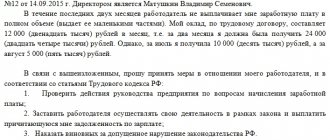Procedure for filing a complaint
The complaint is submitted to a higher tax authority. It must be submitted through the tax office that issued the non-normative act being appealed or committed the actions that became the subject of the appeal.
Having accepted the complaint, the tax authority must, within 3 days from the date of its receipt, redirect it, as well as all materials related to the complaint, to a higher tax authority.
The law does not stipulate the consequences of a situation in which a complaint is sent directly to a higher tax authority; however, based on practice, such complaints are often returned to the person who filed them, which leads to missed deadlines for filing them.
The determination of the possibility of considering a complaint is carried out by the pre-trial tax dispute resolution unit, to which the complaint is transferred within the next day after its receipt by the tax authority.
It takes 3 business days to determine whether the complaint can be considered. During this time, the tax authority finds out whether there are grounds to leave it without consideration. The list of such grounds is established by Article 139.3 of the Tax Code of the Russian Federation.
If such circumstances are established, information about their existence is transmitted to the higher tax authority in a covering letter.
If the complaint is submitted to a higher tax authority, the state duty is not paid.
The form of complaints is not established by law; accordingly, it can be drawn up in any form. The taxpayer must be notified in writing of the results of consideration of the filed complaint in accordance with the requirements of Art. 140 Tax Code of the Russian Federation.
Complaint against a decision in a case of an administrative offense
A complaint against a decision in a case of an administrative offense is a procedural document in which disagreement is expressed either with the decision in whole or with part of it.
This complaint is not an appeal, since the Code of the Russian Federation on Administrative Offenses (hereinafter referred to as the Administrative Offenses Code of the Russian Federation) establishes its own procedure for appealing decisions that have not entered into legal force.
The Code does not provide for the filing of appeals, although both complaints, despite different names, have the same meaning - the cancellation or modification of a decision adopted in the first instance.
Who has the right to file a complaint against a decision in an administrative offense case?
The list of persons who have the right to appeal a decision of a judge or official is named in Articles 25.1 - 25.5.1 of the Code of Administrative Offenses of the Russian Federation. They are:
- a person against whom proceedings are being conducted for an administrative offense (Article 25.1);
- victim (Article 25.2);
- legal representatives of an individual (Article 25.3);
- legal representatives of a legal entity (Article 25.4);
- defender and representative (Article 25.5);
- Commissioner under the President of the Russian Federation for the protection of the rights of entrepreneurs (Article 25.5.1).
In addition, a decision in a case of an administrative offense made by a judge can also be appealed to a higher court by an official authorized in accordance with Article 28.3 of this Code to draw up a protocol on an administrative offense (Part 1.1 of Article 30.1). Those. The right to appeal belongs to the official who drew up the protocol on the administrative offense and sent it to the court for consideration.
Deadline for filing a complaint
A complaint against a decision in a case of an administrative offense may be filed within ten days from the date of delivery or receipt of a copy of the decision.
If the deadline provided for in Part 1 of this article is missed, the specified period, at the request of the person filing the complaint, may be restored by a judge or official authorized to consider the complaint
Complaints against decisions in cases of administrative offenses provided for in Articles 5.1 - 5.25, 5.45 - 5.52, 5.56, 5.58, 5.69 of this Code may be filed within five days from the date of delivery or receipt of copies of decisions
How and where to file a complaint
As established by Art. 30.2 of the Code of Administrative Offenses of the Russian Federation, a complaint against a decision in a case of an administrative offense is submitted to the judge, body, or official who issued the decision in the case. In this case, the complaint can be filed directly with the court, a higher body, or a higher official authorized to consider it.
When appealing a judge's decision to impose an administrative penalty in the form of administrative arrest or administrative expulsion, the complaint is sent to a higher court on the day the complaint is received.
A complaint against a judge’s decision to impose an administrative penalty in the form of administrative suspension of activities is sent to a higher court on the day the complaint is received.
Filing a complaint is not subject to state duty.
Requirements for the content of the complaint
The Code of Administrative Offenses of the Russian Federation does not make any special requirements for the content of a complaint against a decision in a case of administrative offenses. However, the complaint must contain the following mandatory elements:
- Name of the court or body where the complaint is filed;
- Last name, first name and patronymic of the applicant, his actual address of residence;
- Title of the complaint;
- Reference in the text to the contested resolution: by whom and when adopted, the imposed administrative penalty;
- Arguments justifying disagreement with the appealed decision;
- An expressed request to cancel or amend the appealed decision;
- Signature, surname and initials of the applicant, date.
Deadlines for filing a complaint
The time frame within which a complaint against a decision of the tax authority is filed is established by paragraph 2 of Art. 139 of the Tax Code of the Russian Federation. As a general rule, the time limit for filing complaints is one year. The countdown begins from the moment the complainant learned of the existence of a violation of his rights.
If the dispute cannot be resolved out of court, the taxpayer goes to court. requires special attention . Provisions of Art. 198 of the Administrative Code of the Russian Federation establishes that the period for applying to arbitration is three months. Its calculation begins from the moment the plaintiff learned of the violation of his rights.
Article 101.2 of the Tax Code of the Russian Federation has a two-valued interpretation of this issue and states that:
- You can appeal a decision in court only if the pre-trial appeal procedure to a higher authority has been followed;
- the period for appeal begins after the interested person has learned that the decision of a higher authority made against him has entered into force.
At the same time, the higher tax authority that must make the decision is not responsible for violating the deadlines for its adoption and is not subject to punishment for inaction. This issue is not regulated by law and therefore, when filing a complaint, the calculation of deadlines depends entirely on the opinion of the judicial authority considering the case.
If the decision of the Arbitration Court has not entered into legal force, it can be appealed by the interested party involved in the case in the appellate instance. The deadline for filing an appeal against a court decision is one month in accordance with the requirements of Article 259 of the Arbitration Procedure Code of the Russian Federation.
deadlines for filing a complaint after the decision of the appellate court is made. The period within which a complaint is filed against a ruling of the appellate court that did not satisfy any of the parties to the dispute is 2 months after the decision that did not satisfy the party comes into force. The complaint is filed with the cassation authority.
The period within which, after filing a complaint, the Supreme Court must review judicial acts that have entered into legal force, based on the provisions of Article 308.1 of the Arbitration Procedure Code of the Russian Federation, should not exceed two months. Persons who participated in the case can apply to the RF Armed Forces in the order of supervision.
How to write a complaint to the Supreme Court
In order to file a complaint with the Supreme Court, the reason must be very compelling, even exceptional. And, as mentioned above, only after you have received a negative result in all lower courts.
A complaint to the Supreme Court can be filed against decisions that have entered into legal force, or due to the fact that new or newly discovered circumstances have appeared in the case.
The following types of complaints can be submitted to the Supreme Court: appeal, cassation and supervisory.
An appeal is a complaint against a decision of the court of first instance, which has not yet entered into legal force. It is considered within the limits of those arguments that constitute its factual basis - claims that were not submitted to the court of first instance cannot be included in the appeal. Therefore, it is so important that the content and wording presented in this document are as convincing as possible for the Supreme Court.
The purpose of a cassation appeal to the Supreme Court of the Russian Federation is to protect the interests of participants in the trial by changing or canceling the decision of the lower court (first and appellate instance). This complaint is filed against a decision of a judicial authority that has entered into legal force, and the task of a higher court is to verify the legality of the sentence and any other court decision.
If the Supreme Court left, for example, your cassation appeal unchanged and returned it, then there is no point in filing it again - the regulations will not allow this.
Another chance is to file a complaint addressed to the Chairman of the RF Supreme Court. The purpose of this procedure is to challenge the refusal to transfer a cassation appeal to the cassation instance, which was made by a judge of the Supreme Court.
The Chairman of the Supreme Court has the right to disagree with the decisions of other judges of the Supreme Court, and your complaint may achieve your goal.
A complaint in the order of supervision (supervisory complaint) is filed with the Presidium of the Supreme Court of the Russian Federation, which has broader powers than the cassation court. Supervisory complaints to the Supreme Court of the Russian Federation are filed against sentences of courts of constituent entities of the Russian Federation that have entered into legal force, if these sentences have been appealed on appeal to the Supreme Court of the Russian Federation.
In a supervisory appeal, all decisions that have entered into force and adopted by the courts of the first, appellate and cassation instances must be indicated, since these decisions are the subject of review in a supervisory appeal.
If you have reached the stage of filing a complaint in the supervisory order, it means that you have a long and difficult path behind you, which has taken a lot of effort, time and nerves. And it is so important to take this last step confidently and correctly!
Unfortunately, it is precisely at this extremely important stage that errors and omissions that are simply fatal due to their carelessness occur. And they are most often allowed by hired defenders. Here are the most common reasons for the Supreme Court to reject a supervisory appeal.
- A defense attorney who proposes to send a supervisory complaint to the Supreme Court, personally signed by the convicted person, is simply “framing” his ward... Such a document violates the internal regulations of the correctional institution and is illegal. A convicted person has the right to file complaints exclusively through the special unit of the institution in which he is serving his sentence. If it is fundamentally important for a lawyer to submit a supervisory complaint from a prisoner to a higher court, then a covering letter from the head of the correctional institution must be attached to it.
- Attempts, as they say, to “jump over your head” and go straight to the Supreme Court, bypassing the judicial body of the subject of the Federation, are obviously doomed to failure. In order not to waste precious time (and often in litigation it is worth its weight in gold), it is necessary to follow the existing procedure for applying to the courts of various instances.
This is only a small fraction of the pitfalls, errors and omissions that will negatively affect the procedure for filing a supervisory complaint. But she is the very last chance that cannot be missed! And if practicing lawyers make such annoying mistakes, then what can we say about ordinary citizens who are not familiar with even a hundredth part of all the features of the work of a defense lawyer.
Therefore, at the supervision stage it is so important to find not just a good, but a very good lawyer.
Missed deadline for filing a complaint
The legislation of the Russian Federation establishes clear deadlines for the implementation of each procedural action. However, various life circumstances in some cases prevent their implementation, which leads to violation of deadlines and, as a consequence, loss of the opportunity to benefit from justice.
the deadline for filing a complaint is missed for a valid reason, it is possible to restore it. To do this, you must submit an application requesting the restoration of the deadline for filing a complaint . This statement must justify the valid reasons that led to its omission.
Documents attached to the complaint
The documents attached to the complaint are necessary so that the tax authorities can obtain additional information on the circumstances of the case under consideration. The plaintiff can declare mitigating and aggravating circumstances.
The complaint also indicates the fact of non-compliance with the deadlines for filing a complaint and an indication of a request to restore the lost opportunity to submit documents.
Among the attached documents, documents confirming the plaintiff’s arguments about the validity of the complaint are most often used.
For example, data on the calculation of the disputed amount of overpaid fines or penalties, amounts of taxes and fees, tax deductions, etc. If the complaint is filed by a legal representative, then it is necessary to have documents confirming his authority.
Thus, the content of the appeal is identical to the content of other tax complaints. Work with such a document is subject to the requirements of Article 139.2 of the Tax Code of the Russian Federation.
The taxpayer filing a complaint must familiarize himself with the tax laws regarding the forms and procedures for filing a complaint in order to obtain the desired final result.
Author of the article
Valid reasons for missing the deadline for filing a complaint
a list of reasons that are valid and must be indicated in an application to restore the procedural deadline for filing a complaint . In this matter it is necessary to rely on judicial practice.
When deciding whether the reason for missing the deadline for filing a complaint is valid, the courts are guided by Art. 205 of the Civil Code of the Russian Federation, which establishes the grounds on which the term can be restored.
Based on the analysis of arbitration practice, the grounds for reinstating the deadline for filing a complaint may be:
- serious illness that prevented the plaintiff from defending his rights in a timely manner;
- helpless state;
- any force majeure circumstances that the plaintiff can prove, which did not allow him to participate in procedural actions;
- legal illiteracy;
- untimely receipt by the plaintiff of the appealed decision, which excludes his guilt in missing deadlines.
Restoring the deadline for filing a complaint
restore the deadline for filing a complaint, if the reasons for missing it are valid, if it considers that the reasons indicated by the person in the application to restore the deadline were an obstacle to the timely filing of the complaint.
Failure to restore the deadline for filing a complaint serves as grounds for leaving it without consideration.
If the deadline for appealing to a higher tax authority is missed, then the procedure for pre-trial settlement of the dispute is considered not to have been followed, and the person loses the right to go to court.
The same applies to the deadline for filing a complaint to restore the missed deadline.
Extension of the deadline for filing a complaint
a petition must be filed with a request to restore the missed deadline for filing the complaint.
for the form of a request to restore the deadline for filing a complaint , but the likelihood of its satisfaction increases significantly if the following rules are followed when drawing it up:
- clearly state the reasons that led to missed deadlines;
- make references to the provisions of the law governing the procedure for filing a complaint and restoring the deadline for filing it;
- document the validity of the reasons that led to missing the deadline.
The decision to leave the complaint without consideration, made following the consideration of the request to extend the deadline for filing a complaint, is made within 5 days after its filing.
The person who filed the complaint is notified of the decision in writing within three days from the date of its adoption.
However, if a higher tax authority accepts a complaint that was filed late for its consideration and considers it, the court will accept the corresponding application of the taxpayer for its proceedings.








